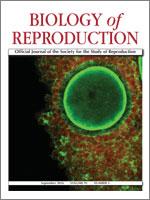Establishment of pregnancy requires interaction between the developing conceptus and the uterine mucosal immune system. Myeloid lineage cells (macrophages and dendritic cells) are key mediators of pregnancy in rodents and humans but relatively little is known regarding their role and distribution during early pregnancy in ruminants. We tested the hypothesis that myeloid lineage cell number, distribution, and function are altered during early pregnancy in dairy heifers. Dairy heifers were inseminated using sperm from a single bull (Day 0), and uteri and blood were collected at slaughter on Days 17 and 20 of pregnancy to investigate the response of myeloid lineage cells to the presence of a conceptus. Responses were compared to noninseminated heifers on Day 17 of the estrous cycle. Peripheral blood and uterine-derived immune cells were isolated magnetically and examined using flow cytometry. Immunohistochemical analysis was used to evaluate the spatial distribution of myeloid lineage cells in the endometrium and quantitative polymerase chain reaction was conducted to quantify abundance of mRNA transcripts associated with myeloid lineage cell function. Transcripts for major histocompatibility complex (MHC) II, cluster of differentiation (CD) 80, CD86, CD163, and indoleamine 2,3-dioxygenase (IDO) 1 were greater in endometrium of pregnant compared to cyclic heifers. Immunofluorescence analysis revealed increased labeling for MHCII and SIRPA in pregnant compared to cyclic heifers. There were approximately 50% more CD14 CD11c cells in the peripheral circulation of pregnant compared to cyclic heifers. A greater number of myeloid lineage cells were observed during early pregnancy, and this increase was most pronounced in and around the shallow glands. Furthermore, expression of molecules associated with a tolerogenic or alternatively activated phenotype of these cells also increased in pregnant heifers. The results support the hypothesis that myeloid lineage cells with a tolerogenic phenotype are involved in establishment of pregnancy in dairy heifers.
How to translate text using browser tools
10 August 2016
Changes in Myeloid Lineage Cells in the Uterus and Peripheral Blood of Dairy Heifers During Early Pregnancy
Manasi M. Kamat,
Sreelakshmi Vasudevan,
Samar A. Maalouf,
David H. Townson,
Joy L. Pate,
Troy L. Ott
ACCESS THE FULL ARTICLE

Biology of Reproduction
Vol. 95 • No. 3
September 2016
Vol. 95 • No. 3
September 2016
cattle
conceptus
dendritic cell
macrophage
pregnancy
uterus




